These 5 yoga mat workouts can help improve your core stability and balance at home
Yoga mat workouts can help you stretch out and strengthen at home, here the experts reveal the ones to try
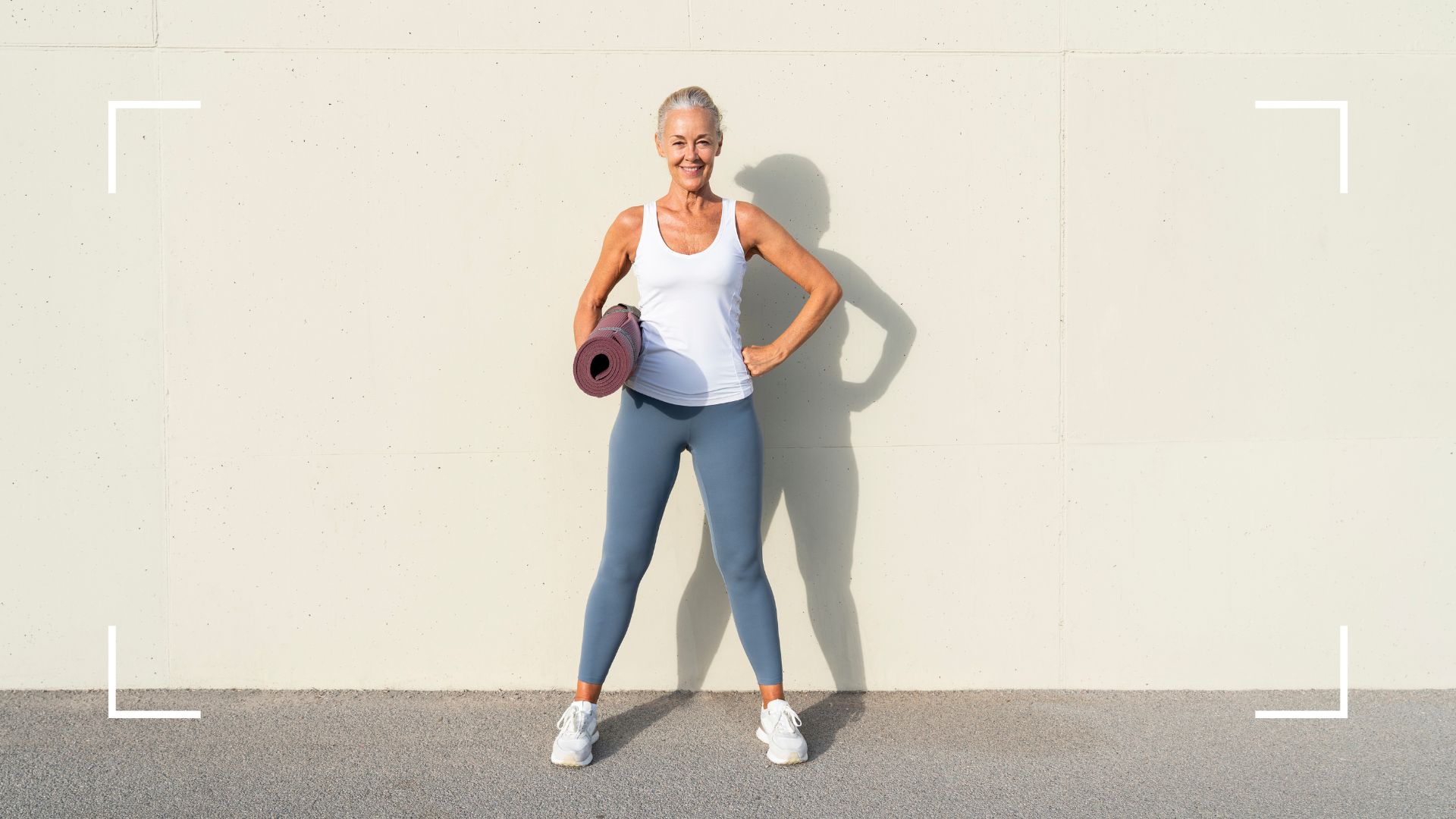

If you're looking for a new way to exercise at home, why not try yoga mat workouts? Unlike indoor cycling or weight training, there's no need for equipment and the simple exercises go a long way to helping improve your core stability, strength, balance, and overall fitness.
A pick of the best yoga mats is essential though. Whether you're looking to do a quick 15-minute yoga session or delve into the world of online workouts, you'll need a yoga mat that can support you all the way. Thick yoga mats made of foam are better for exercises where you'll need more support, such as Pilates, yoga, and core work, while thinner mats made of rubber will be a grippier choice for those wanting to move quickly.
Needless to say, you'll also need the space around you to move. But apart from that, the best yoga mat workouts can be done anytime and anywhere. Here are the expert-recommended ones to try this weekend, suitable for beginners up to everyday yoga enthusiasts.
Benefits of using a yoga mat in your workout
1. Supports your joints
Soft and springy when put under pressure, yoga mats offer a layer of cushioning between you and the ground. If you have hardwood floors in your home or want to exercise in the garden, this can be particularly beneficial.
Whether you're standing, seated, lying down, on your back, or doing a chair workout, a mat supports the joints around any part of the body that comes into contact to ensure that exercise is as comfortable as it can be.
2. Can help to prevent injury
Many yoga mats offer alignment assistance that can help to prevent injury during a session. For example, the Lifeorme Yoga Mat has practical markers etched into the material that will align with the cues given by instructors, either in-person or via one of the best yoga apps, so you know you're putting your feet and body in the recommended positions during your yoga mat workouts. It's a great idea for anyone doing yoga for beginners especially.
Equally, if you're planning to get sweaty with hot yoga or get your heart rate up, having a yoga mat with a decent grip and sweat-proofing can prevent you from slipping away from the position.
Sign up to our free daily email for the latest royal and entertainment news, interesting opinion, expert advice on styling and beauty trends, and no-nonsense guides to the health and wellness questions you want answered.
3. Keeps your space more hygienic
Yoga mat workouts tend to be easier to tidy away when you're working out from home. You can exercise on the mat, unconcerned that sweat is going to reach the floor or furnishings in your home, and simply wipe down the mat when you're done.
That being said, you should also know how to clean a yoga mat as an unclean mat can pass on bacteria just as easily as not using one at all.

Made from natural tree rubber, this is a great mat for workouts where you need a little extra grip and stability. At 3mm, it's one of the thinner mats so a better choice for those doing yoga, Pilates, and HIIT workouts.
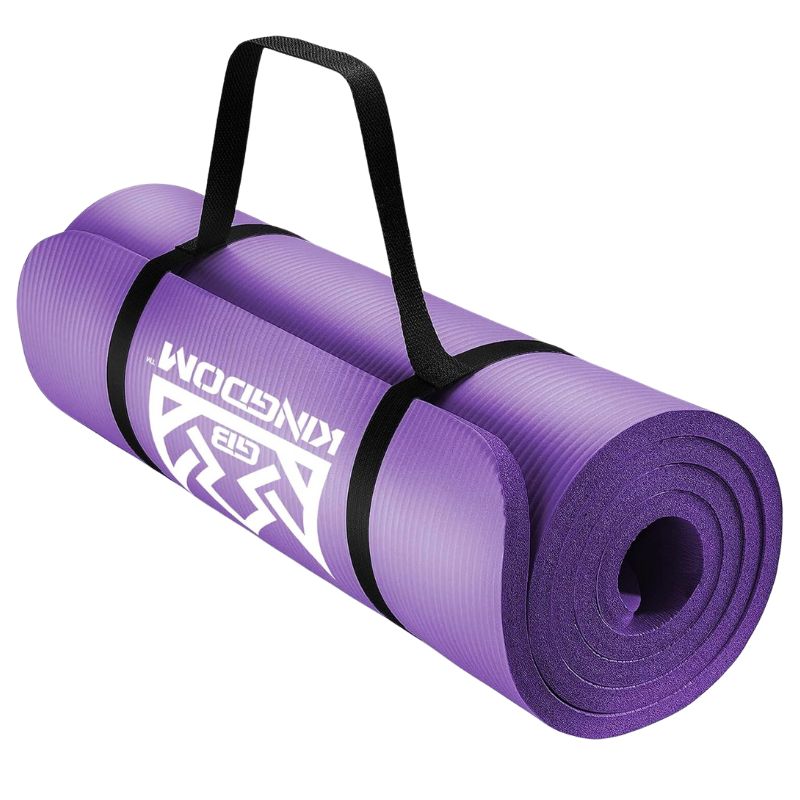
With an impressive 20mm of thickness, this is the top pick for a thick yoga mat. It comfortably supports the knees, hips, and spine with an ultra-cushioned, non-slip foam material, measuring 6ft long by 2ft wide. It's ideal for those in need of a little more support in their movement.
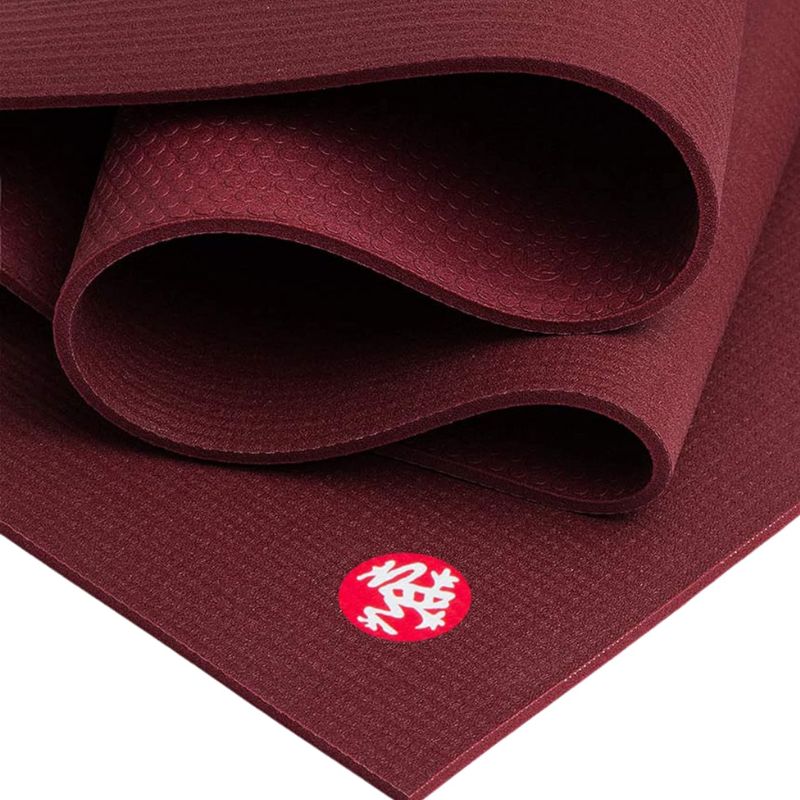
The Manduka Pro is a latex-free, premium mat that comes with a higher price point at £116 but it's bound to last a lifetime. The closed-cell surface keeps moisture and bacteria away, meaning it's not only more hygienic but the longevity is almost guaranteed. It also feels high-quality under foot and hand and comes in multiple colours to suit your style.
Yoga mat workouts
1. Strength training
While yoga and Pilates are obvious yoga mat workouts, did you know you can do a strength training routine from one with little to no equipment? Whether you're looking to get stronger or maintain muscle mass through menopause, training with resistance has so many benefits, including helping with daily movement and a lower long-term risk of osteoporosis.
Joey Bull, a personal trainer specialising in exercise for women going through menopause via Issviva, says that this type of exercise can be daunting if you've not done it before but there are a couple of key exercises to try from your mat. Try the following, eight repetitions of each movement for three rounds, for a full-body workout.
Before you start, be sure to warm up, she says. "Swing your arms, bend your knees, and jog around, wiggling your hips and spine, anything that works for you to be ready."
- Plank rows: These target your core, shoulders, and lower back. "Begin on a soft surface or mat on all fours. Use a dumbbell in each hand if you have any and alternate lifting your hand or weights to your ribs, ensuring a controlled, straight-backed posture," says Bull. A set of adjustable dumbells can be useful if you're at home as you need just one pair to complete your whole workout.
- Press-up: Most people doing strength training at home for beginners won't be able to do a press-up on their first go, so try a modified push-up instead if you can't yet manage a full down. While still targeting your chest muscles, this involves dropping your knees to the floor, rather than going down to the floor in a plank position. Be sure to hold in your core whichever one you do though.
- Staggered squat with dumbbell bicep curls: "Position your feet apart with one further forward and the back one wide. With the front foot and knee pointing forward and the back foot and knee pointing outwards, bend your knees and open the hips. Execute this Sumo squat simultaneously performing a bicep curl," she says. Try 8 on each side, to develop strength in the legs, glutes, and biceps.
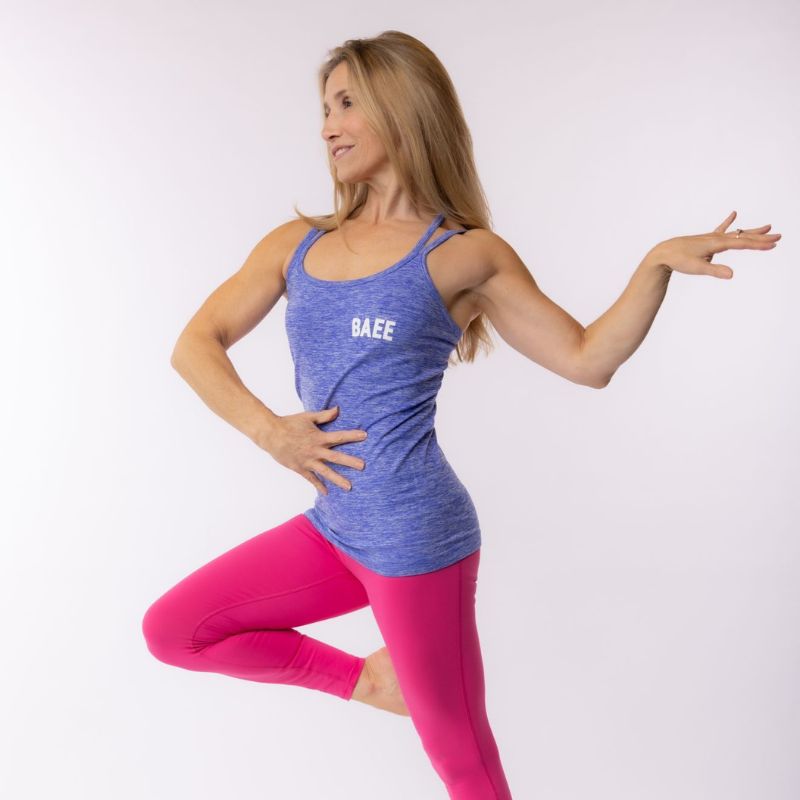
Joey Bull has extensive experience in the industry, working with children to seniors, novices to athletes. Her particular interest in optimal living led to the development of her courses and events 'The Best is Yet To Come'. She was invited to host the National Fitness Awards in 2021 and appears regularly on BBC radio. Joey has nine workout DVDs to her name which have sold internationally and been dubbed into several languages. She has also been a fitness magazine cover girl in her mid 50s.
2. Exercises to prevent lower back pain
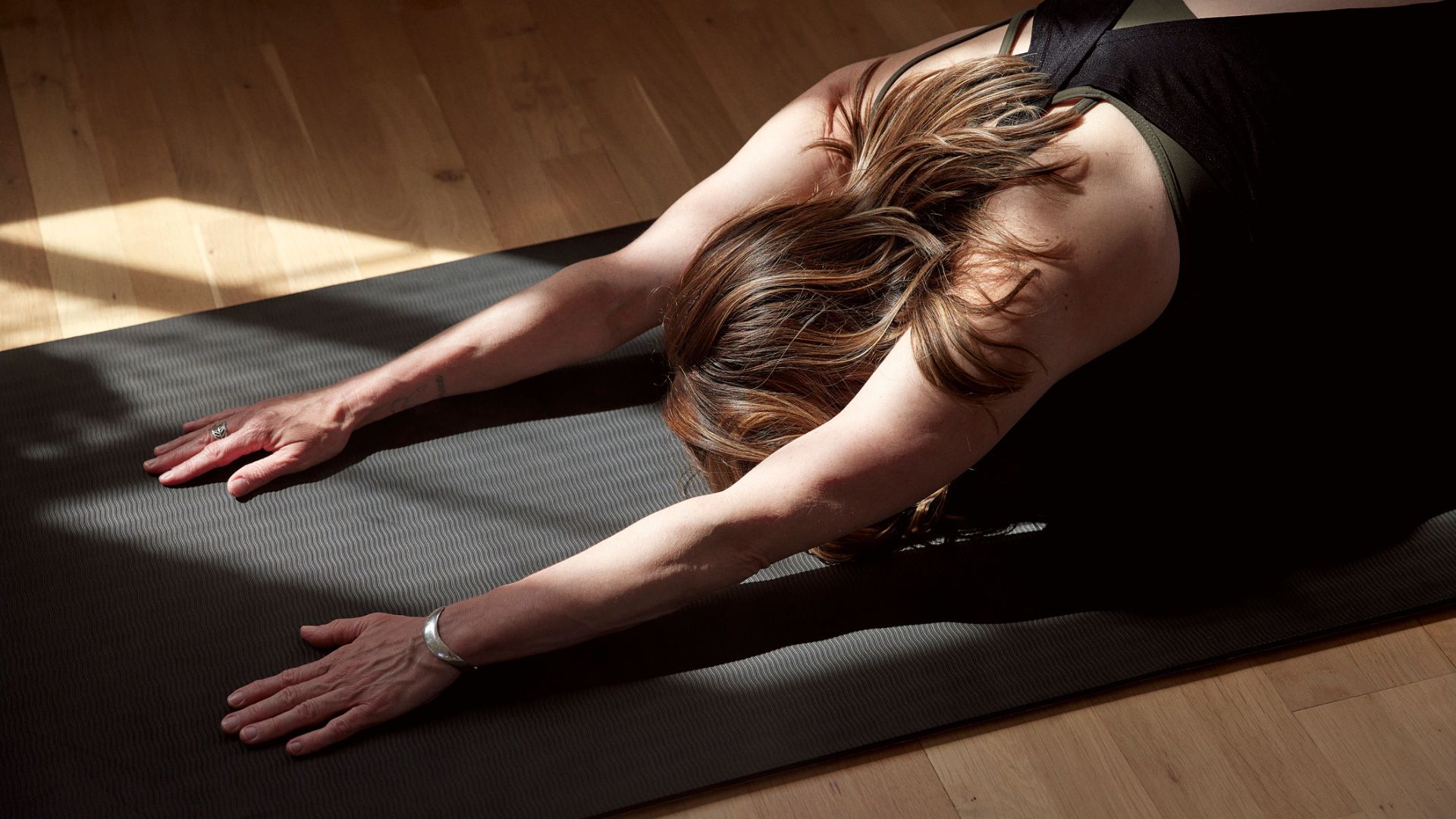
Child's pose is a classic yoga position that can help stretch out and alleviate discomfort around the lower back.
As much as yoga mat workouts can be strenuous, they can also be rehabilitation from exercise or even daily movement issues. Even the simplest yoga stretches for beginners can relieve aches and pains. Lower back pain is a common complaint for many of us who spend our days sitting down at desks or otherwise have mobility issues. Strengthening the lower back and core muscles that surround it with core exercises at home can help alleviate some of the pressure and pain.
Here, personal trainer and specialist women's health coach Kate Rowe-Ham reveals her favourites from her book Owning Your Menopause: Fitter, Calmer, Stronger in 30 Days.
- Dead bugs: "Lie on the mat with your arms extended straight over your chest so they form a perpendicular angle with your torso. Bend your hips and knees 90 degrees, lifting your feet from the ground. Your torso and thighs should form a right angle, as should your thighs and shins. This is the starting position," says Rowe-Ham.
- Engage your core: "Maintain contact between your lower back and the mat. You want to ensure your spine maintains this steady and neutral position throughout the exercise."
- Keep your left arm and right leg exactly where they are: "But slowly reach your right arm backwards, over your head and towards the floor, as you simultaneously extend your left knee and hip, reaching your left heel towards the floor," she says.
- Swap sides: "Moving slowly and steadily, breathing in as you perform the extensions, avoiding any twisting or movement of your hips and abs. Stop the movement just before your arm and leg touch the ground."
- Child's pose: "Start on all fours and drive your hips back so your bottom connects with your heels," says the personal trainer. "Extend your arms away from your head but in contact with the mat. Place your forehead on the mat."
- Cat Cow: "Start on your hands and knees, making sure your wrists, elbows and shoulders are aligned," she suggests.
- Tilt your pelvis back so that your tailbone sticks up: "Your belly will drop down, but draw your belly button into your spine. Take your gaze gently up towards the ceiling without cranking your neck."
- Release the tops of your feet to the floor: "Tip your pelvis forward, tucking your tailbone under. Draw your belly button towards your spine. Drop your head. Take your gaze to your belly button."

Kate Rowe-Ham is a level 3 qualified personal trainer specialising in helping women reach their fitness potential. As the founder of Owning Your Menopause, she prides herself on helping clients find a love for exercise, giving them the tools they need to adopt a sustainable approach to exercise with long-lasting results.
3. Wall Pilates
As well as a classic full-body Pilates workout, a yoga mat offers the chance to try other types of stretching and strengthening, Pilates-style yoga mat workouts like wall Pilates. The yoga mat is needed to support your feet, ankles, knees, and hips, so it's better to opt for a thicker variety if you're looking to try this one.
"Wall Pilates is simply traditional Pilates exercises done against a wall to add resistance," explains Abby McLachlan, a Pilates teacher and founder of East of Eden. "It’s super low impact, great for beginners, and it can offer all the benefits of Pilates, including core strength, flexibility, better posture, and spine alignment."
Try these three simple moves to get started:
- Wall roll down: With the yoga mat under your feet, stand with your back against the wall and roll down gradually, tucking your chin into your chest and bending forward. Gradually, roll back up.
- Single leg balance: Stand with your back to the wall and lift one leg off the ground, holding the position for at least 30 seconds.
- Wall squat: Place your feet on the mat hip distance apart and sit down into a squat, using the wall behind you to support your spine and head. Aim for a flat back and 90-degree angle to your knees. To make it harder, lift your arms out and up.

Abby McLachlan is a Pilates instructor and Founder of East of Eden, an inclusive wellness hub in the heart of Walthamstow. East of Eden offers pilates, yoga, barre, hot classes, pre and post natal classes and more, both online, and in person.

4. Yoga to improve your balance
We'd be remiss if we didn't mention doing yoga as a workout on a mat. This selection, as revealed by personal trainer and coach Christianne Wolff, can help to develop balance and coordination.
- Tree pose: "Begin by standing on your yoga mat with your feet hip-width apart," she suggests. "Shift your weight onto your left foot and lift your right foot off the ground then place the sole of your right foot on the inner left thigh or calf, but avoid the knee. Bring your palms together in front of your chest or extend your arms overhead. Focus your gaze on a fixed point to help maintain balance, and old the pose for 30 seconds to 1 minute, then switch sides."
- Warrior III: "Start in a standing position with your feet hip-width apart. Shift your weight onto your right leg and lift your left leg straight behind you, parallel to the floor," she says. "At the same time, reach your arms forward with your palms facing each other. Keep your torso and raised leg in a straight line, and old for 30 seconds to 1 minute, then switch sides."
- Half moon: "Begin standing with your feet together. Step your left foot back, keeping the front foot pointing forward and the back at a 45-degree angle," Wolff says.
- Extend your arms: "Keep them parallel to the ground, reaching them actively in opposite directions."
- Shift your weight: "Move from your left to right leg, bend your right knee slightly, and place your right fingertips or hand on the mat or a block. Lift your left leg parallel to the ground, toes pointing left."
- Open your chest: "Focus on the left side and extend your left arm towards the sky, creating a straight line from your left fingertips to your left toes," she says.
- Gaze up toward your left hand if comfortable for your neck.
- Hold the pose for 30 seconds to 1 minute, then switch sides.

Christianne Wolff is a multi-award-winning, bestselling author of 7 books in The Body Rescue Plan series. She is a qualified personal trainer, Astanga and Hatha Yoga instructor, healer and pilates teacher, and a nutritionist to the stars.
5. Indoor cardio
Looking to get your cardiovascular fitness up with a couple of workouts a week? No need to go outside. While donning your pick of the best running shoes and pounding the pavements certainly has its benefits, colder weather and hard pavements can put anyone off giving it a go.
Running on your yoga mat or completing 'high-knee' movements can offer an at-home workout to improve your fitness, while also providing some extra cushioning for your feet, ankles, knees, and hips.
For those concerned about pelvic floor health, Rowe-Ham has alternative suggestions. "I would also suggest mountain climbers, plank taps, jumping jacks or stepping jacks, and side shuffles," she says. "Those will elevate the heart rate and will improve cardiovascular fitness without jarring the body too much."
The same goes for walking as a workout and other high-energy sessions, like dance workouts, with many routines available to try on one of the best workout apps like Peloton or Apple Fitness+.
If you're updating your yoga mat, consider the criteria on how to choose the right yoga mat for your workouts. It's not only materials you should take into account before picking up yoga mat workouts but also the weight, length, thickness, grip, and style of your potential buy as this can make all the difference to your session.

Grace Walsh is woman&home's Health Channel Editor, working across the areas of fitness, nutrition, sleep, mental health, relationships, and sex. She is also a qualified fitness instructor. In 2025, she will be taking on her third marathon in Brighton, completing her first ultra marathon, and qualifying as a certified personal trainer and nutrition coach.
A digital journalist with over seven years experience as a writer and editor for UK publications, Grace has covered (almost) everything in the world of health and wellbeing with bylines in Cosmopolitan, Red, The i Paper, GoodtoKnow, and more.